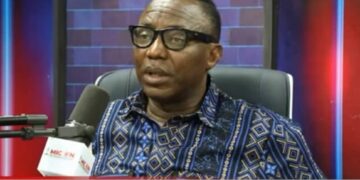Former Minister of Information and ex-President-General of Ohanaeze Ndigbo, Chief John Nwodo, has issued a grave warning about Nigeria’s deteriorating political and economic conditions, urging immediate and far-reaching reforms to prevent national disintegration.
Speaking at the public presentation of Bubbles of Nigeria’s Democracy and Wadata Wonders, two books by veteran journalist Mr. Ike Abonyi in Abuja, Nwodo painted a bleak picture of the country’s trajectory.
He decried the government’s rising debt, collapsing infrastructure, and deepening inequality.
Citing figures from the Debt Management Office (DMO), Nwodo revealed that Nigeria’s public debt stood at $94 billion (₦144.7 trillion) by the end of 2024, with an additional $24 billion loan awaiting approval.
“This could push the total debt to ₦183 trillion,” he said. “It is unsustainable, especially with shrinking capital budgets, rising inflation, and unreliable oil revenues.”
As a solution, he advocated for a return to agriculture, recalling Nigeria’s past prosperity during the groundnut pyramids, cocoa exports, and palm oil production.
“During that time, we witnessed growth in industry, education, and infrastructure,” Nwodo said, blaming the system’s collapse on military interference and the adoption of a unitary constitution.
Reflecting on Nigeria’s growing social divide, the former minister shared a personal anecdote: “I attended the same school as the son of our driver. There was no distinction between the children of the rich and the poor,” he said. “Today, that gap has widened dangerously. It’s a recipe for a class war.”
He recounted his days as a student leader at the University of Ibadan, where he was elected Students’ Union President by a predominantly Yoruba student body.
“Nobody cared about your ethnicity. It was about competence. Today, merit is dead.”
Turning to politics, Nwodo condemned what he described as the “dictatorship of political parties,” where governors and primaries hand-pick candidates plagued by corruption. “Sometimes, the ticket goes to the highest bidder,” he added.
He also criticised the Senate’s “take-a-bow” tradition during ministerial screenings. “There was a time when competence mattered. Now, mediocrity is rewarded in the name of representation,” he said.
Nwodo called for urgent national restructuring to restore true federalism. “States must control their resources. This is the only path to equity and development,” he stressed, adding that without restructuring before the 2027 elections, Nigeria risks political instability.
“We may face election boycotts by some regions, leading to a constitutional crisis we may not survive,” he warned.
Quoting Shakespeare’s Julius Caesar, he concluded: “There is a tide in the affairs of men, which, taken at the flood, leads on to fortune… We must take the current when it serves, or lose our ventures.”
Highlighting Nigeria’s declining quality of life, Nwodo referenced the UN’s World Population Prospects 2025, which places Nigeria at the bottom of global life expectancy, just 54.8 years.
“We are now behind countries like Chad, South Sudan, and the Central African Republic,” he said, calling it a damning indictment of the country’s healthcare and infrastructure.
He also drew attention to Nigeria’s crumbling road network, citing a Business Day report and World Bank estimates showing the country loses over $1 billion annually due to bad roads.
“Ninety per cent of goods and passengers are moved by road. Yet our roads are in ruins,” he said, linking poor infrastructure to massive post-harvest losses of up to 40 per cent, directly undermining agriculture and food security.
To address the issue, Nwodo proposed creating a “Nigerian Road Army” composed of unemployed youths and local engineers. “Let’s stop outsourcing our development. Mobilise our youth, train them, equip them, and let them rebuild our roads,” he added, calling for a national policy on infrastructure development.
Also speaking, chairman of the occasion Alhaji Mohammed Hayatudeen commended the collective effort behind the publication and underscored the importance of safeguarding democracy through informed journalism.
“This is more than a book launch,” he said. “It is a national reflection and a tribute to the power of the written word in shaping our democracy.”
He paid tribute to Mr. Abonyi’s decades-long career, describing the books as “a labour of love and legacy.”
“These books are more than memoirs. They are mirrors, inviting us to reflect on our national path. They tell the stories of struggle, power, and purpose — and demand that we learn from them,” he said.
He also shared a compelling excerpt from the book “In democracy, power often feels like a mirage — visible yet evasive, frequently promised but ever so distant.
We vote every four years, yet remain denied the freedom of choice. We speak daily, yet remain unheard.”
Also, Former Labour Party presidential candidate in the 2023 election, Mr. Peter Obi, emphasised the importance of written reflections in national development.
“I’m going to talk about the idea of writing more, so that others can read, learn, and listen to what is happening,” he said.
“We are working hard to build a new Nigeria — one where political parties are structured, functional, and not merely tools of those in government. Those of us who are fortunate to be in government have shaped the parties. But we must hope for a future where parties are bigger than individuals — and run like those in other developed nations.”
He concluded by thanking those contributing to the country’s intellectual development:
“I thank all those who are writing. Let us remain committed to building that new Nigeria.”





